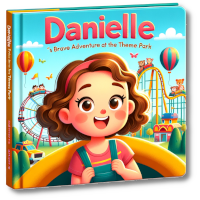Reading with children
a blog by Magic Tales

Once Upon A Time: Unveiling the Mystical Power of Pretending and Emotional Intelligence in Children's Literature
Children's literature is not just about fairy tales and whimsical stories; it's a wholly dedicated realm where kids learn, grow, and explore their understanding of the world. Among the myriad of lessons that children's books impart, two stand out as particularly impactful: the power of pretending and emotional intelligence.
Pretend Play & Story-telling
The act of pretending plays a crucial role in a child's development, contributing to their creativity, problem-solving skills, and perspective-taking abilities. Reading a story from a children’s book involves a fair amount of pretending. As kids dive into these stories, they pretend to be the characters, visualizing their adventures, problems, and triumphs.
Children immerse themselves in different scenarios and, in the process, 'walk in the character’s shoes'. This pretend-play stimulates their minds, driving them to think critically and exploring a range of possible solutions to navigate the narrative. A great portion of books for children integrate imaginative elements, empowering children to dream, reflect, and expand their thought horizons.
The Art of Empathy: Emotional Intelligence and Reading
Emotional intelligence is another realm that can be effectively developed through children’s literature. Books are, indeed, a potent source of learning about emotions. The challenges, conflicts, and resolutions in stories make characters more relatable and help children recognize and understand a diverse range of emotions.
When children identify with a character and their experiences, they start to sympathize, thereby developing empathy. Undeniably, empathy is an essential component of emotional intelligence. The more children read, the more they unveil about emotions, relationships, and human nature, which fosters their emotional literacy.
Integrating Pretending and Emotional Intelligence
Imagine a blend of pretending and emotional intelligence for a moment - doesn’t it sound magical and profound? Books offer that blend by allowing children to pretend to be characters and understand their feelings and emotions. They learn to identify complex emotions and reason about moral dilemmas, thereby fostering both cognitive and emotional growth.
In children’s books, the synergy of pretending and emotional intelligence creates a powerful milieu for children to grow and thrive - psychologically, emotionally, and intellectually. So, let us continue to read stories, tell tales, fuel imaginations, and nurture emotional wisdom in our youngsters because books, after all, are the stepping stones to dreams and emotional understanding.
Through the unique combination of pretending and emotional intelligence, we can facilitate children's holistic development. This magical journey is not limited to just our kids but extends to the story-tellers and readers as well. As we delve into the world of children’s literature with its rich plethora of pretending and emotions, we might discover that we, too, have grown a little bit more.
Want a personalized book to read with your child about Pretending?
Takes as quickly as 30 seconds to create
Create a book about Pretending

